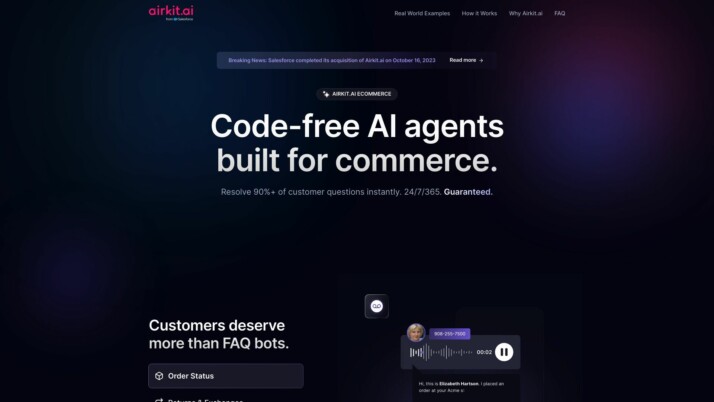Airkit AI vs. Automaited: Comparing AI Automation Platforms
AI-powered automation platforms are reshaping how businesses operate, streamline processes, and enhance customer experiences. This comparison of Airkit AI vs. Automaited, and SmythOS reveals the unique strengths and limitations of each platform. Airkit AI specializes in ecommerce customer service automation, while Automaited offers versatile business process automation for non-technical users.
SmythOS emerges as a comprehensive solution, providing advanced features like visual builders, debug modes, and multi-agent collaboration. We’ll explore how these platforms stack up in terms of ease of use, integration capabilities, and overall functionality, helping you make an informed decision about which AI automation tool best suits your business needs.
Airkit AI Overview
Airkit AI revolutionizes customer service with its AI-powered platform designed for the ecommerce sector. Recently acquired by Salesforce, Airkit AI enables businesses to deploy intelligent, code-free AI agents that automate omnichannel customer support. These agents excel at resolving common ecommerce queries related to orders, returns, and product information.


The platform’s standout feature is its ability to deploy AI agents rapidly without coding requirements. Airkit AI integrates seamlessly with existing helpdesk and CRM solutions, allowing businesses to enhance their customer service capabilities effortlessly. The AI agents boast an impressive 90%+ resolution rate for repetitive customer requests, significantly reducing the workload on human agents and preventing burnout.
Airkit AI enables businesses to deploy intelligent, code-free AI agents that automate omnichannel customer support. These agents excel at resolving common ecommerce queries related to orders, returns, and product information.
Airkit AI offers a cloud-based solution with auto-scaling capabilities, ensuring businesses can meet demand spikes without compromising performance. The platform’s pre-built conversational skills for the ecommerce industry enable quick deployment of AI agents tailored to specific business needs. Continuous learning capabilities allow these agents to improve their resolution skills over time, adapting to new scenarios and customer inquiries.
While Airkit AI provides powerful automation tools, it may lack some advanced features found in more comprehensive AI development platforms. The focus on ecommerce-specific solutions, while beneficial for that sector, might limit its applicability in other industries. Additionally, the recent acquisition by Salesforce may lead to changes in the platform’s roadmap and integration priorities.
Airkit AI’s integration with Salesforce Service Cloud positions it as a robust solution for businesses already using Salesforce products. This integration allows for seamless data flow and enhanced customer insights. However, companies not invested in the Salesforce ecosystem may find the platform less attractive or more challenging to integrate with their existing tech stack.
Automaited Overview
Automaited delivers an AI-powered automation platform designed to streamline business processes without requiring technical expertise. The platform excels in automated data transfer, text generation, and content summarization, catering to a wide range of industries and applications.


Automaited’s key strengths lie in its user-friendly interface and natural language interaction capabilities. Users can create and refine automations by simply chatting with the AI, providing instructions in plain language. This approach democratizes process automation, making it accessible to businesses regardless of their technical expertise.
Users can create and refine automations by simply chatting with the AI, providing instructions in plain language.
The platform supports over 1,000 applications, facilitating seamless data transfer between various systems such as ERP, CRM, and popular platforms like LinkedIn, HubSpot, and Slack. Smart buttons embedded within users’ workflows enable easy execution of automated tasks, enhancing productivity and reducing human error.
Automaited emphasizes compliance and security, ensuring GDPR-compliant data handling. However, the platform appears to lack some advanced features found in other AI agent builders, such as a visual builder, debug mode, or multi-agent collaboration. While it excels in automating repetitive tasks and improving efficiency, it may not be ideal for users seeking more complex AI development capabilities.
Ultimately, Automaited positions itself as a solution for businesses looking to improve operational efficiency through accessible AI-powered automation. Its focus on intuitive interfaces and seamless integration with existing workflows makes it a compelling option for non-technical users and organizations aiming to streamline their processes quickly and effectively.
Feature Comparison
Airkit AI and Automaited offer distinct approaches to AI-powered automation, each with its own strengths and limitations. Airkit AI excels in ecommerce customer service automation, providing code-free AI agents that integrate seamlessly with existing helpdesk solutions. Its focus on omnichannel support and high resolution rates for customer queries makes it particularly valuable for businesses prioritizing customer experience. However, Airkit AI’s specialization in ecommerce may limit its applicability in other industries.
Automaited, on the other hand, offers a more versatile platform for general business process automation. Its natural language interaction capabilities allow users to create automations through simple conversations, making it accessible to non-technical users. Automaited’s strength lies in its ability to facilitate data transfer between over 1,000 applications and generate content like emails and reports. However, it lacks some advanced features found in more comprehensive AI development platforms.
Both platforms fall short in certain areas compared to SmythOS. Neither Airkit AI nor Automaited offer a visual builder or debug mode, which are crucial for more complex AI development tasks. Additionally, they lack support for multi-agent collaboration and advanced deployment options like webhooks or GPT integration. SmythOS provides these features, along with a hosted vector database and support for various file types, offering a more comprehensive solution for AI agent development and deployment across diverse use cases and industries.
Feature Comparison Table
| Airkit AI | Automaited | SmythOS | |
|---|---|---|---|
| CORE FEATURES | |||
| Hosted Agents (Dev, Production) | ✅ | ❌ | ✅ |
| Environments (Dev, Production) | ✅ | ❌ | ✅ |
| Visual Builder | ❌ | ❌ | ✅ |
| Explainability & Transparency | ❌ | ✅ | ✅ |
| Debug Tools | ❌ | ❌ | ✅ |
| Multimodal | ❌ | ❌ | ✅ |
| Multi-Agent Collaboration | ❌ | ❌ | ✅ |
| Audit Logs for Analytics | ❌ | ❌ | ✅ |
| Work as Team | ❌ | ✅ | ✅ |
| Agent Work Scheduler | ❌ | ✅ | ✅ |
| SECURITY | |||
| Constrained Alignment | ✅ | ❌ | ✅ |
| OAuth | ✅ | ❌ | ✅ |
| IP Control | ❌ | ❌ | ✅ |
| COMPONENTS | |||
| Foundation AIs | ❌ | ❌ | ✅ |
| Huggingface AIs | ❌ | ❌ | ✅ |
| Zapier APIs | ❌ | ❌ | ✅ |
| Classifiers | ❌ | ❌ | ✅ |
| Logic | ❌ | ✅ | ✅ |
| Data Lakes | ❌ | ❌ | ✅ |
| DEPLOYMENT OPTIONS (EMBODIMENTS) | |||
| Deploy as API | ❌ | ❌ | ✅ |
| Deploy as Webhook | ❌ | ❌ | ✅ |
| Staging Domains | ❌ | ❌ | ✅ |
| Production Domains | ✅ | ❌ | ✅ |
| API Authentication (OAuth + Key) | ❌ | ❌ | ✅ |
| Deploy as Site Chat | ✅ | ❌ | ✅ |
| Deploy as Scheduled Agent | ❌ | ❌ | ✅ |
| Deploy as GPT | ❌ | ❌ | ✅ |
| DATA LAKE SUPPORT | |||
| Hosted Vector Database | ❌ | ❌ | ✅ |
| Sitemap Crawler | ❌ | ❌ | ✅ |
| YouTube Transcript Crawler | ❌ | ❌ | ✅ |
| URL Crawler | ❌ | ❌ | ✅ |
| PDF Support | ❌ | ✅ | ✅ |
| Word File Support | ❌ | ✅ | ✅ |
| TXT File Support | ❌ | ✅ | ✅ |
Best Alternative to Airkit AI and Automaited
SmythOS emerges as the superior alternative to Airkit AI and Automaited, offering a comprehensive platform for AI agent development and deployment. Our solution combines powerful features with user-friendly design, making advanced AI capabilities accessible to users across various technical backgrounds.
We provide a visual drag-and-drop interface that simplifies the creation of complex AI workflows. This approach democratizes AI development, allowing users to build sophisticated agents without extensive coding knowledge. Our platform supports integration with a wide array of APIs, AI models, and tools, including popular services like Slack, Trello, and GitHub, ensuring compatibility with virtually any business process.
SmythOS offers unparalleled versatility. We support multi-agent systems, enabling teams of AI agents to collaborate on complex tasks.
Unlike Airkit AI’s focus on ecommerce customer service or Automaited’s general business process automation, SmythOS offers unparalleled versatility. We support multi-agent systems, enabling teams of AI agents to collaborate on complex tasks. This feature significantly enhances the efficiency and scalability of AI implementations across diverse industries and use cases.
SmythOS stands out with its advanced deployment options. Users can deploy their AI agents as APIs, webhooks, site chats, or even as ChatGPT plugins. This flexibility ensures seamless integration into existing systems and workflows. Additionally, our platform provides robust debugging tools, explainability features, and support for multimodal interactions, addressing limitations found in both Airkit AI and Automaited.
By choosing SmythOS, users gain access to a powerful, scalable, and user-friendly platform that outperforms Airkit AI and Automaited in key areas. Our solution empowers businesses to harness the full potential of AI, driving innovation and efficiency across their operations.
Conclusion
Airkit AI and Automaited offer valuable solutions for specific automation needs, but SmythOS emerges as the superior choice for businesses seeking comprehensive AI agent development and deployment capabilities. Airkit AI excels in ecommerce customer service automation, while Automaited provides accessible process automation for non-technical users. However, both platforms lack the advanced features and flexibility that SmythOS delivers.
SmythOS stands out with its powerful visual builder, debug mode, and support for multi-agent collaboration. These features, combined with advanced deployment options like webhooks and GPT integration, position SmythOS as a versatile platform suitable for a wide range of industries and use cases. The hosted vector database and support for various file types further enhance its capabilities, making it an ideal choice for businesses looking to leverage AI across multiple domains.
For organizations seeking to harness the full potential of AI automation, SmythOS offers unparalleled flexibility and scalability. Its drag-and-drop interface democratizes AI development, while the extensive integration ecosystem ensures seamless connectivity with existing workflows. Whether you’re a developer, business leader, or AI enthusiast, SmythOS provides the tools to create sophisticated AI agents that can transform your operations.
To experience the power of SmythOS firsthand, create a free account and start building AI agents today. With unlimited agents available during the trial period and a 30-day money-back guarantee, you can explore the platform’s capabilities risk-free. Discover our diverse range of AI-powered agent templates to jumpstart your projects and unlock new levels of productivity and innovation for your business.
Last updated:
Disclaimer: The information presented in this article is for general informational purposes only and is provided as is. While we strive to keep the content up-to-date and accurate, we make no representations or warranties of any kind, express or implied, about the completeness, accuracy, reliability, suitability, or availability of the information contained in this article.
Any reliance you place on such information is strictly at your own risk. We reserve the right to make additions, deletions, or modifications to the contents of this article at any time without prior notice.
In no event will we be liable for any loss or damage including without limitation, indirect or consequential loss or damage, or any loss or damage whatsoever arising from loss of data, profits, or any other loss not specified herein arising out of, or in connection with, the use of this article.
Despite our best efforts, this article may contain oversights, errors, or omissions. If you notice any inaccuracies or have concerns about the content, please report them through our content feedback form. Your input helps us maintain the quality and reliability of our information.
